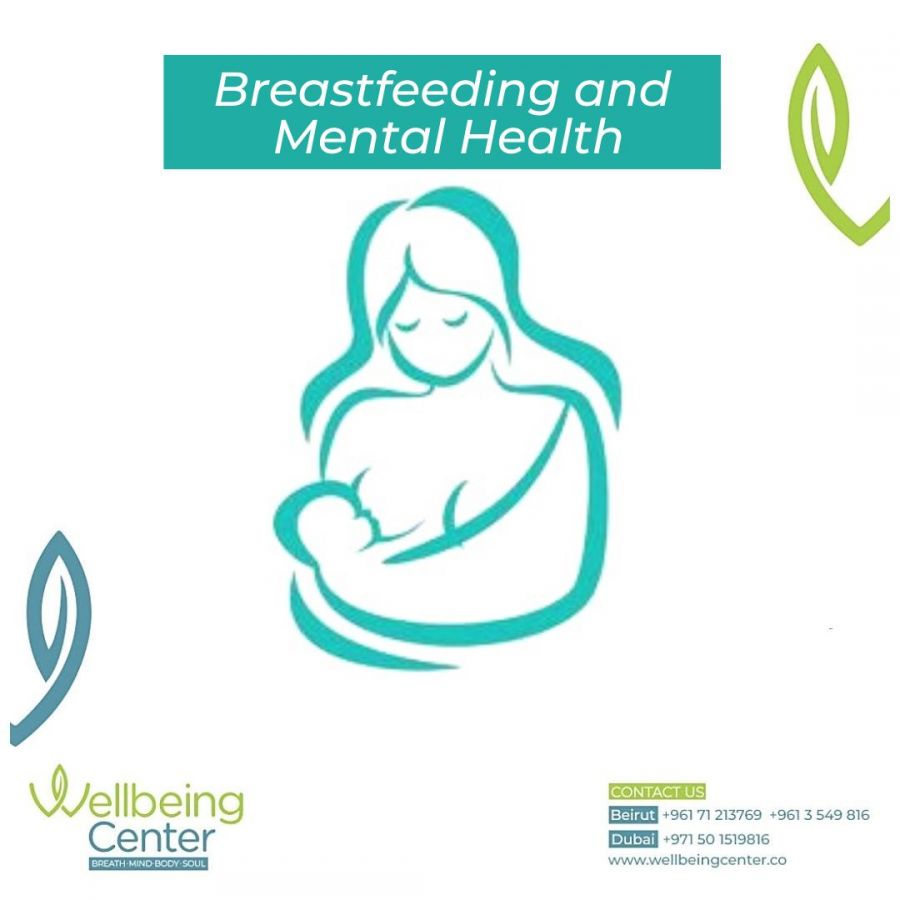Breastfeeding and Mental Health

There are many benefits for both the infant and the breastfeeding person. These include mental health benefits. However, difficulties with breastfeeding can impact the mental health of the breastfeeding person. They can be a factor that may lead to the development of perinatal mood and anxiety disorders (PMADs).
Protective Factors
Breastfeeding helps with infant nutrition and development. It can benefit the person breastfeeding as well. Several studies have shown a lowered stress response in breastfeeding persons. One factor to this lowered stress response is the release of oxytocin and prolactin hormones. These hormones produce a calming effect during breastfeeding. Another factor is that breastfeeding lowers inflammation, which can be a risk factor for depression. When breastfeeding is successful and persons report meeting their breastfeeding goals there is a reduced risk for PMADs.
Many breastfeeding persons have reported breastfeeding being a “lifeline” for them in managing the mood changes and stressors of the postpartum time. Breastfeeding can be a central part in feeling bonded with the infant. Meeting breastfeeding goals can also help persons feel a sense of confidence as they transition into their role as a parent.
However, when there are breastfeeding difficulties, a breastfeeding person may see a negative impact in their mental health.
Risk Factors
The breastfeeding relationship is complex. Each breastfeeding person and their baby has a unique relationship, with its own strengths and barriers. Being prepared with information and support can be a powerful tool in building the breastfeeding relationship.
Some individuals who breastfeed may feel symptoms of anxiety or depression related to their breastfeeding difficulties. Breastfeeding difficulties can be a risk factor for the development of PMADs. These feelings can present in a variety of ways. There may be feelings of anxiousness about whether their baby is latching or receiving enough breastmilk. Or there might be worries about whether or not their feeding issues can be resolved.
Some people feel grief and disappointment if they are unable to meet their breastfeeding goals. Others may feel guilty or fear judgment from others regarding their inability to breastfeed.
When breastfeeding difficulties are causing a significant amount of stress, anxiety, or depression, the mental health of the person must be considered in addition to their breastfeeding goals. The risks associated with PMADs must be weighed against the benefits of breastfeeding. The decision to continue or stop breastfeeding must be an empowered choice for the person. It is best made with information, support, and an assessment of what is best for the person.
In addition to common breastfeeding challenges, there are also two conditions impacting mental health during the breastfeeding journey. These are Dysphoric Milk Ejection Reflex, also known as D-MER, and post-weaning depression.
- Dysphoric Milk Ejection Reflex
Some breastfeeding persons experience a brief and intense feeling of dysphoria (a feeling of unease) just before their milk “lets down”, or releases from the breast. This experience is called Dysphoric Milk Ejection Reflex or D-MER. Persons who experience D-MER may feel intense anxiety, anger, depression or hopelessness. For some, it is only experienced at the beginning of the feeding. For others it is experienced during each letdown during a feeding. D-MER is thought to be a response to a severe drop in dopamine during letdown. Usually breastfeeding persons with D-MER are able to learn coping methods. They are usually relieved to learn the cause of their experience. Breastfeeding persons with D-MER are usually able to continue breastfeeding with the condition.
- Post-Weaning Depression
Some breastfeeding persons report feelings of depression when weaning from breastfeeding. This may include feelings of sadness, anxiety, mood swings or irritability. It is thought that this is due to the drop in frequency of prolactin and oxytocin release as the frequency of breastfeeding sessions decrease. For some, these symptoms only last a few weeks. For others, the intensity of symptoms can cause great distress and can last longer. Breastfeeding persons with a history of depression or persons who have to abruptly wean from breastfeeding tend to be at higher risk for post-weaning depression. It is important to seek help, especially when there are preexisting mental health concerns or if symptoms of depression develop during weaning.
